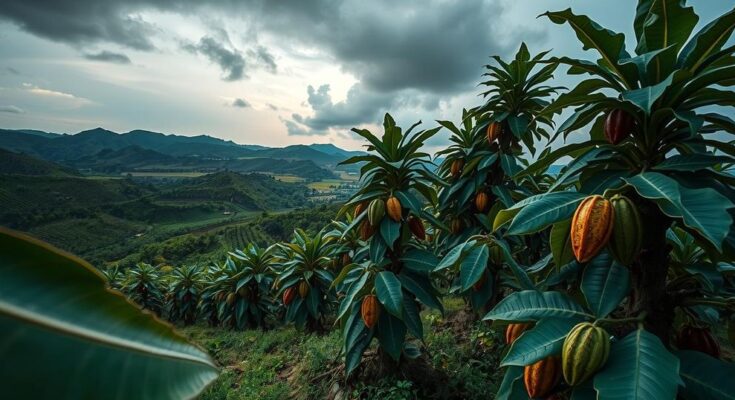A report by Christian Aid reveals that climate change has substantially increased cocoa prices, leading to a 400% rise in recent years, with temperatures in key cocoa-growing regions exceeding optimal levels. The report emphasizes the urgent need for emissions reduction and climate finance support for farmers grappling with significant production challenges.
A new report from Christian Aid underscores the immense impact of climate change on cocoa production, emphasizing a troubling rise in cocoa prices leading up to Valentine’s Day. The study reveals that cocoa prices have surged by 400% in recent years due to extreme weather conditions, which have become more prevalent due to climate change. Notably, the 2023 heatwave in West Africa has been rendered ten times more likely by human actions, which exacerbates cocoa production challenges in regions critical for this commodity.
In 2024, climate change contributed to an alarming increase in temperatures across cocoa-producing nations, with over 71% of these areas experiencing six additional weeks of days above 32°C. These extreme temperatures are significantly detrimental to cacao cultivation, particularly in major producing countries including Côte d’Ivoire, Ghana, Cameroon, and Nigeria. Meanwhile, British chocolatiers are grappling with the repercussions, as they report severe losses and challenges in sourcing cocoa, with businesses feeling that the crisis has impacted all corners of the chocolate industry.
The increasing temperatures and erratic rainfall patterns, amplified by climate change, have resulted in substantial declines in cocoa yields in Ghana and Côte d’Ivoire, which account for over half of global cocoa production. Due to these conditions, the availability of cocoa on the market has plummeted, driving prices to unprecedented levels. For instance, on December 18, 2024, cocoa prices peaked at $12,605 per ton, reflecting the dire state of supplies influenced by severe weather patterns and disease affecting crops.
The 2023 cocoa shortage was precipitated by an unusual combination of excessive rainfall and subsequent drought conditions, leading to catastrophic crop failures. According to the United Nations, Ghana’s 2024 drought impacted over one million individuals, driving up food prices and exacerbating the already challenging conditions for cocoa farmers. Evidence shows that climate change has dramatically increased the likelihood of these adverse heat events, affecting the viability of cocoa farms globally.
Christian Aid’s Osai Ojigho highlights the pressing need for action to mitigate emissions and enhance climate financing for cocoa growers, which are essential to support their adaptation strategies. “Growing cocoa is a vital livelihood for many of the poorest people around the world, and human-caused climate change is putting that under serious threat,” she stated. Cocoa farmers are increasingly facing distressing situations as crops continue to decline due to climate adversities.
Amelia, a 24-year-old cocoa grower from Guatemala, articulates the crisis: “My plantations have been dying due to the lack of water… the cocoa trees are dying, which are usually very resilient.” Similarly, Andy Soden from Kernow Chocolate asserts that climate variations have severely reduced global cocoa outputs, posing existential threats to smaller chocolatiers who cannot adapt as easily as larger companies.
Alexander Carnwath of the Fairtrade Foundation emphasizes that achieving environmental sustainability in cocoa supply chains is inextricably linked to social and economic sustainability. Higher prices for cocoa must coexist with effective actions from governments, especially in wealthier countries, to support this imperative. Crafting trade policies that equitably benefit farmers globally is essential in securing sustainable cocoa production.
In summary, the cocoa industry is facing unprecedented challenges due to climate change, resulting in significant price increases and reduced yields. This crisis affects not only the availability of cocoa but also the livelihoods of farmers reliant on this crop. As climatological conditions continue to worsen, immediate global action is necessary to support sustainable cocoa farming and mitigate further impacts of climate change.
Original Source: reliefweb.int




